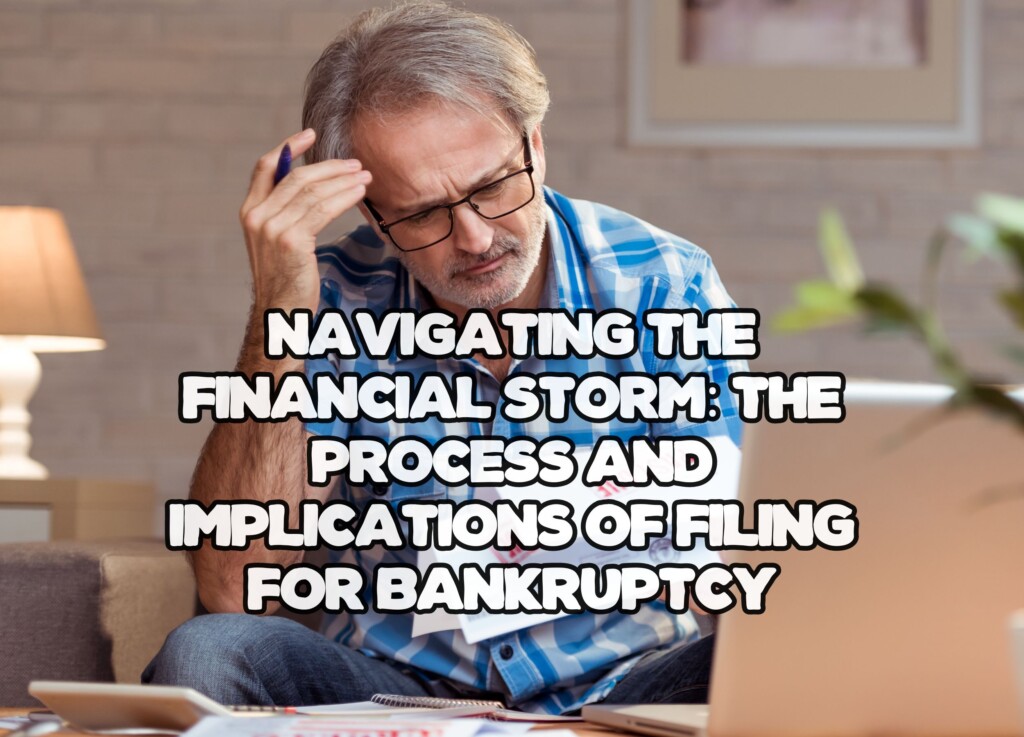The What and Why: Understanding Bankruptcy
Bankruptcy is a legal process that allows individuals or businesses to seek relief from debts they can’t repay. While it can provide a fresh financial start, it’s a significant decision with long-lasting consequences. Before you go down this road, it’s crucial to understand the process and weigh the pros and cons.

The Steps: How to File for Bankruptcy
- Consult a Financial Advisor or Attorney: The first step is to consult with a financial advisor or bankruptcy attorney to assess your financial situation. They can help you decide if bankruptcy is the right option for you.
- Choose the Type of Bankruptcy: There are different types of bankruptcy, most commonly Chapter 7 and Chapter 13 for individuals. Your financial situation will dictate which one you should file for.
- File the Petition: Once you’ve chosen the type, you’ll need to file a petition with the bankruptcy court. This includes all your financial information, like assets, debts, and income.
- Automatic Stay: After filing, an automatic stay is issued, which temporarily halts actions by creditors to collect debts.
- Trustee Appointment: The court will appoint a trustee to oversee your case and liquidate your non-exempt assets to pay off creditors.
- Creditors Meeting: You’ll have to attend a meeting with your creditors, where they can ask you questions about your financial situation.
- Debt Discharge: At the end of the process, most of your debts will be discharged, meaning you’re no longer legally required to pay them.
The Pros: Why You Might Consider Filing
- Financial Fresh Start: Bankruptcy can wipe the slate clean, allowing you to start anew.
- Stops Harassment: Filing for bankruptcy puts an end to harassing calls and letters from creditors.
- Asset Protection: Certain types of bankruptcy can protect your assets from being seized.
The Cons: Why You Might Think Twice
- Credit Score Hit: Filing for bankruptcy will significantly impact your credit score, making it difficult to secure loans or credit in the future.
- Long-lasting Consequences: A bankruptcy filing can stay on your credit report for up to 10 years.
- Not All Debts are Covered: Student loans, alimony, and child support are generally not dischargeable in bankruptcy.
The Final Word: To File or Not to File
Filing for bankruptcy is a significant decision that should not be taken lightly. It can offer a way out of crippling debt but comes with severe financial and emotional costs. Always consult with professionals to explore all your options.
For more financial guidance, visit RichMoneyMind.com for free money help and resources.
By understanding the ins and outs of bankruptcy, you can make an informed decision that’s best for your financial future. Whether you decide to file or seek alternative solutions, knowledge is your most valuable asset.
Alternative Routes: Other Options to Consider
Before pulling the trigger on bankruptcy, it’s worth exploring other avenues for financial relief. Debt consolidation, negotiating with creditors, or even selling off assets could provide enough financial breathing room to avoid bankruptcy. These alternatives can also have less severe consequences for your credit score and financial future.
Emotional Toll: It’s Not Just About Money
Beyond the financial implications, there’s an emotional aspect to consider. The stress and stigma associated with bankruptcy can take a toll on your mental health and personal relationships. It’s a public process, meaning your financial woes become part of the public record, which can be a hard pill to swallow for many.
The Role of Professional Guidance
Whether you’re leaning towards filing for bankruptcy or seeking other solutions, professional guidance is invaluable. Financial advisors can offer strategies for budgeting and debt repayment, while bankruptcy attorneys can navigate the complexities of bankruptcy law. Don’t underestimate the importance of expert advice in making this life-altering decision.
The Long Road Ahead: Life After Bankruptcy
If you do decide to file for bankruptcy, it’s not the end of the world. Many people have successfully rebuilt their financial lives post-bankruptcy. It will require discipline, smart financial choices, and a strong support system, but recovery is possible. You’ll need to work diligently to rebuild your credit and make informed financial decisions moving forward.
By taking the time to fully understand the process and implications of bankruptcy, you’re better equipped to make the right choice for your financial well-being. Whether you opt for bankruptcy or an alternative route, the key is to be informed and proactive. And for additional financial resources and guidance, don’t forget to check out RichMoneyMind.com.
As an Amazon Associate we earn from qualifying purchases through some links in our articles.




